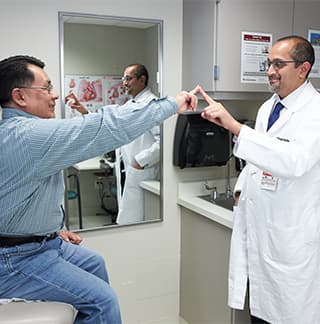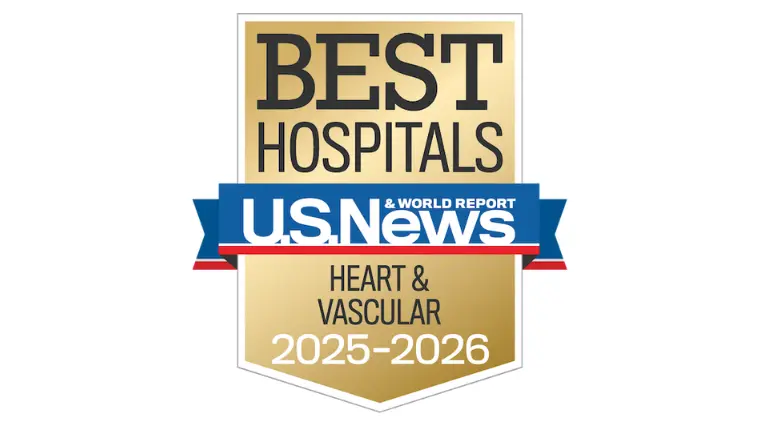Carotid Artery Disease
Pioneers of Carotid Artery Disease
The University of Chicago Medicine is a certified Comprehensive Stroke Center, and our physicians have an established history of scientific breakthroughs related to stroke and carotid arterial disease. In fact, researchers at UChicago Medicine first demonstrated how atherosclerosis can result in carotid artery blockages. Our team has the skill and expertise to deliver unparalleled care for patients with carotid artery disease.
What is carotid artery disease?
Carotid arteries are located on either side of the neck and are responsible for supplying blood to the brain. Carotid artery disease, also known as cerebrovascular insufficiency, is characterized by a carotid artery blockage or narrowing in one or both of the carotid arteries. Most frequently, this narrowing results from atherosclerosis, or "hardening of the arteries due to plaque."
Carotid arteries channel blood to the brain, and if they become too narrow, a stroke or a transient ischemic attack (mini-stroke) may occur.
Carotid Artery Disease Risk Factors and Causes
While atherosclerosis, plaque build-up in the arteries, is the most common cause of carotid artery disease, there are several risk factors that can lead to atherosclerosis and increase the risk of disease, such as:
- Family history of the disease
- Genetics predisposition for CAD
- Alcohol and/or drug use,
- Smoking,
- Diabetes,
- High cholesterol
- High blood pressure (hypertension)
Carotid Artery Disease Symptoms
Since each section of the brain controls different bodily functions, symptoms of carotid artery disease, or a stroke, can vary depending on the location of the narrowed artery. Common symptoms include:
- Dizziness
- Headache
- Speech and comprehension difficulties
- Weakness in or inability to move limbs
- Vision impairment
Diagnosing Carotid Artery Disease
Our vascular surgeons work together with a multidisciplinary team that includes neurologists and interventionalists to provide optimal care to patients with carotid artery disease.
Getting an accurate, early diagnosis offers patients the best chance for a successful outcome. We offer free screenings for those at risk for carotid artery disease so we can diagnose disease early and give our patient the best chance for long-term success.
Carotid Artery Disease Treatments
Treatment plans — including medical, interventional and surgical options — are personalized for each patient. The team may recommend medical treatment and close follow-up for patients with mild carotid artery disease. For more severe disease, our team performs innovative surgical and nonsurgical procedures to reduce the risk of stroke.
Carotid Endarterectomy
Carotid endarterectomy, also known as carotid artery stenting or carotid artery surgery, is the surgical removal of plaque that has built up inside the carotid artery. With carotid endarterectomy, a small incision is neck right at the source of the blockage, allowing your vascular surgery to remove plague and add a stent around the remaining plague to improve blood flow through the carotid artery.
Transcarotid Artery Revascularization
UChicago Medicine is only one of a few hospitals offering transcarotid artery recascularization (TCAR), an innovated treatment for patients suffering from carotid artery disease.TCAR provides a minimally invasive alternative to open surgery for patients with severe carotid artery disease. During the procedure, your vascular surgeon uses a specialized device to create a small incision in the neck near the carotid artery and place a stent around the blockage. This new technique redirects blood flow away from the carotid artery so that damaging particles, such as plague, cannot reach the brain during the procedure, ultimately avoiding the risk of stroke, clots and other potentially fatal conditions.
Neurovascular Surgery
The neurovascular surgery team offers options of extracranial to intracranial bypass, carotid microsurgery and the repair of intracranial aneurysms and other vascular anomalies.

Heart-Brain Clinic
The Heart-Brain Clinic has a team of cardiology and neurology specialists who collaborate to diagnose, treat and prevent conditions that impact the heart and brain, such as atrial fibrillation (AFib) or cryptogenic stroke.
Learn more about our clinic.Nationally Ranked in Cardiology, Heart Surgery and Vascular Surgery

Request an Appointment
We are currently experiencing a high volume of inquiries, leading to delayed response times. For faster assistance, please call 1-773-702-6128 to schedule your appointment.
If you have symptoms of an urgent nature, please call your doctor or go to the emergency room immediately.
* Indicates required field
Find a Vascular Surgery Location Near You
Understanding Carotid Artery Disease
The common carotid artery is a blood vessel. You have two carotid arteries that run up each side of your neck. Each artery divides into two branches. The external carotid branch sends off more branches to your face, scalp, and neck. The internal carotid branch supplies blood to your brain.
Causes. When the carotid arteries are healthy, they let blood flow freely through them. But sometimes, plaque can build up inside your arteries. Plaque is a pasty substance made up of cholesterol, fats, calcium, and other things that are found in the blood. This is a condition called atherosclerosis.
Atherosclerosis can cause the space inside the arteries to get narrow. This might fully or partially block the artery. Blood clots can also form on the plaque.
In some cases, a small piece of plaque or a blood clot can break off and float away and get stuck in an artery of the brain. This can stop blood flowing to part of the brain and cause a stroke. Certain things can damage the inside of the carotid arteries and make them more likely to gather plaque. These include smoking, high levels of cholesterol and certain fats in the bloodstream, high blood pressure, insulin resistance, and diabetes.
Symptoms. Carotid artery disease often doesn't cause any symptoms until the carotid artery is severely narrowed. Often, the first symptoms are those of a mini stroke, which is also known as a Transient Ischemic Attack, or TIA. This happens when a piece of plaque or a blood clot blocks blood flow to the brain for a short period of time.
You may have symptoms such as sudden weakness in the face or limbs, often on just one side, inability to move a limb, trouble speaking or understanding speech, trouble seeing, and dizziness. With a mini stroke, these symptoms last only a few minutes. But a mini stroke is often a warning sign that a more serious stroke can happen. With a stroke, the symptoms can continue, and the lack of blood to part of the brain causes damage. If you ever have symptoms of a mini stroke, call 911 right away.
Diagnosis. A health care provider may suspect carotid artery disease when listening to your arteries with a stethoscope. The blocked artery often makes a whooshing sound known as a bruit. If you have a bruit, you will need a test called a carotid ultrasound.
This test uses sound waves to create a picture of the inside of your arteries. This shows how much the arteries have narrowed. In some cases, other imaging tests may be needed. You'll also need other tests if you have symptoms of a stroke.
Treatment. Treatment for carotid artery disease depends on how severe it is, your age, and your overall health. You may need to take medications to lower your high blood pressure, and you may also need to take a blood-thinning medication like aspirin to help prevent blood clots and lower your risk for stroke.
Lifestyle changes can also help keep your carotid artery disease from getting worse. This includes following a healthy diet, exercising regularly, and quitting smoking. If your carotid artery disease is severe, you may need surgery to help open your artery.
Things to remember. Carotid artery disease doesn't always cause symptoms. Carotid artery disease is dangerous because it can lead to a stroke. You might need lifestyle changes, medications, or surgery to treat your carotid artery disease.
It can be scary to learn that you are at risk for a stroke due to carotid artery disease, but you can take steps to help reduce your risk. Talk with your health care provider to find a treatment plan that makes sense for you. What we have learned.
People who smoke are at a lower risk for carotid artery disease, true or false? The answer is false. People who smoke are at a higher risk for carotid artery disease.
You might need to take a blood-thinning medication like aspirin to help prevent stroke, true or false? The answer is true. Blood-thinning medication can reduce the risk of a blood clot forming and causing a stroke.
